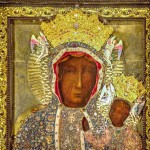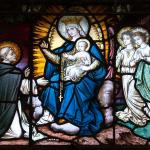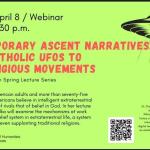![Moses before the Burning Bush Icon - Theotokos Burning Bush 16th Century - by Ted, 26 Feb 2013 (8509410242_1834d7d113_o.jpg) (CC BY-SA 2.0 [https://creativecommons.org/licenses/by-sa/2.0/]), via Flickr](https://wp-media.patheos.com/blogs/sites/721/2017/08/8509410242_1834d7d113_o.jpg)
When it was my turn to be blessed (are. you. ready…?), it was said of me that it was apparent that I ‘really care about God.’ They said that they didn’t pretend to understand my Eastern Catholicism or half of what I post on social media. But what is that thing you always post, Justin? they said. Something about the Theo…Theo…Theotokos? Yeah, you really care about theology.
I didn’t have the heart to tell them that that was probably the part of my theology that they’d find the most objectionable – the parts about the Mother of God – but I am reminded every so often that any word with the prefix theo- in it tends to sound profound to my evangelical Protestant sisters and brothers, in the sense that such words are supposed to be too advanced for ordinary people to understand. Early on in my catechumenate, for example, my wife overheard me chanting the prayers from the Jordanville Prayerbook and rushed into the room: ‘Theologos, save us?! Whaaaat?‘
I think the theo- effect, if you will, has something to do with the fetish for Greek among evangelical Protestants who want to sound scholarly, which usually has the effect of turning ordinary evangelicals off. A wise older evangelical once told me that he really despised some of the intellectual preaching that he heard from young pastoral interns, ears still wet from seminary, as just showing off. Who cares if you know this Greek word or that Hebrew phrase? he said. All you are doing is alienating the average person in the pews, taking the Word of God away from them.
The word Theotokos is probably a case in point, though it is not a word found in Scripture, to be sure. At one point in my Anglican journey, I had a spiritual director who was a retired Presbyterian pastor who attended the same parish I did. His spirituality, as well as his wife’s, had been deeply affected by the charismatic movement blowing through their church, and they continued to speak in tongues, see visions, get words of knowledge, and on and on. One day they came over to my house for a visit, and they began to admire how many books I had. You can know a lot about a person from the books that they have, the director’s wife said, which worried me because I have a fairly eclectic collection. As I made coffee, I asked her what she thought of me based on my book collection. Curious, she replied, you are a curious person.
For some reason, as we spoke over coffee (my director muttered that the coffee was quite good, which was nice to hear), the topic of Mary came up. My director’s wife said that she had spoken with a prominent Anglican theologian of a fairly strong Calvinist persuasion recently, and he had told her that Mary is the most misunderstood woman in the whole Gospel. Emboldened by this claim, she had taught her grandchildren how a rosary works; she said this as she pulled one out of her pocket and wrapped it around her wrist. I was very excited by this and recounted how a Catholic nun had told me that she had seen the Virgin Mary standing next to me a few years ago – me, a Protestant! – and they told me that they had also felt her maternal presence in their lives, but that they could hardly share that with fellow Protestants who would not understand.
I remarked that it was actually quite strange to reject Marian veneration outright, as I had learned from studying introductory theology that there was a council between the ones that affirmed the coequal divinity of the Son with the Father and the union of the fully divine and fully human natures of Christ. In the Third Ecumenical Council at Ephesus, Mary was affirmed as the Theotokos, the God-bearer, and because of that was also Mētēr tou Theou, Mother of God, as it is God who came forth from her womb – this is why the man who is born of the Theotokos is also fully God. I spoke with some excitement about this, only to have my spiritual director and his wife stare at me, with mouths gaping open. They said that it was a bit on the academic side, as far as they were concerned, but that maybe God had made me intellectual. I tried to reiterate that my point was that if you are going to have the Trinity and the two natures of Christ as the litmus test of orthodoxy, you’re going to need the Theotokos too – but that too went over their heads.
The assessment of my Protestant sisters and brothers about my spirituality is, to be sure, bang on: the truth is that I did arrive at my devotion to the Theotokos in what my evangelical sisters and brothers would call a very academic way. I totally found myself geeking out, for example, when I first heard the Eastern Jesuit who is now my spiritual father offering the part in the litanies remembering our most holy and immaculate, most blessed and glorious Lady, the Theotokos, and ever-virgin Mary. I learned quite quickly, however, that I am not so special when it comes to the Orthodox: we had a Greek Orthodox visitor at the temple, and whenever we got to that point in the liturgy, he chanted softly, Most Holy Theotokos, save us. What happens when one is Greek, I suppose, is that sometimes one speaks Greek, and it is neither particularly impressive nor scholarly; it’s just a way of being in the world.
I did not grow up Greek, and even now, my Greek is very poor; because of this, I had to learn about the Theotokos from an introductory class in theology taught by evangelical Protestants at Regent College, which means that my knowledge of such things, especially when I had that coffee conversation, was elementary and shallow (and I don’t think things have changed much since). In that course on Christian Thought and Culture, we had been assigned to read a marvelously ecumenical text by the British theologian Jonathan Hill called The History of Christian Thought. Written in remarkably accessible prose, Hill lays out the contours of the Christian tradition in all of its diversity – affirmative and negative traditions with an emphasis on Dionysius the Areopagite, the tradition of logos going back to St Justin Martyr, desert mothers and fathers and the rise of monasticism in the West through St Benedict, the origins of hesychasm with colorful treatments of St Symeon the New Theologian and St Gregory Palamas, the complementarity between St Dominic and St Francis – all introductory stuff, really.
Within these treatments was a fascinating section on the Council of Ephesus in 431. Hill gives a rousing rendition of the politics of the council, the caricaturing of Nestorius as a heretic who taught that Christ was two persons in one body (which is probably not really what he taught), and the failure of the Greeks to wait for all the bishops of the church (especially the Antiochians) to show up at the council. Hill showed that out of this chaos came the interesting doctrines of the Theotokos as the Mother of God that was the lynchpin for the formulation of Christ having two united natures in one person, what was later called at the Fourth Ecumenical Council at Chalcedon the hypostatic union: two natures in one united hypostasis. In this, Hill also asked us to be fair to Nestorius, calling into question whether Nestorius himself was a Nestorian for having insisted on Mary being Christotokos, the bearer of Christ. Questioning whether Nestorianism is itself a caricature of Nestorius in turn opens the door to considering whether the insistence on this Greek formulation has been the linguistic source of some stumbling with the Syriac churches that do not accept Nestorius’s condemnation – likely the same churches that evangelized India and China. By opening up this question, Hill seemed to be strengthening the claim for Mary to be Theotokos – if Nestorius himself was not as Nestorian as the Council of Ephesus claimed, then wouldn’t this mean that at some deep level, Nestorius might have agreed on the primal truth underlying the Theotokos and the hypostatic union, whatever his views on the Greek word might be?
Truth be told, it was a bit disconcerting to discover in a Protestant school of Christian studies (which is what Regent is) that the person I had always taken as the stumbling block between ‘Catholics and Christians’ – Mary Godbearer – was actually a key figure in establishing the very orthodox doctrine of Jesus Christ as fully human and fully divine and that those who disagreed with this formulation were not really fighting over much theological turf. I liked how the Archbishop of Canterbury at the time, Rowan Williams, explained it in his book on Arius, which I read for my final paper for that course, when he said that orthodoxy is not the same thing as conservatism, because conservatives often want to protect God from the messiness of the human world (which is why Arius argued that Jesus wasn’t God, but only like God and sub-divine) while orthodoxy usually requires Christian theologians to be more creative than the heretics. Mary’s role in what theologians call the ‘economy of salvation’ – God’s redemption of all creation in the person of Jesus Christ – struck me as one of these creative orthodox moves. It also occurred to me that I should be taking this seriously as a point of orthodox Protestantism; most Protestants, after all, would affirm the formulations of the Trinity and the hypostatic union, so why not also of the Theotokos?
Soon, all this became prayer. I wound up the next year at the house of the Latin priest who had taught me creative writing in high school and had mentioned while I was still very Protestant that he had been trying to get me to see that we are in what Hans Urs von Balthasar called a theo-drama, a theater piece orchestrated by God to save the world. There, I ploughed through Balthasar’s book on Prayer, which has in its opening pages an innocuous line about the words of the ‘Hail Mary’ as biblical words themselves from the lips of Elizabeth to Mary when she visits her: Blessed are you among women, and blessed is the fruit of your womb. I also found in the priest’s library a book by Luigi Gambero titled Mary and the Fathers of the Church, which admits that on the one hand, there is relative silence about Mary in Scripture and the early church fathers, but on the other hand, there are hymns to Mary by the second century, like ‘Beneath your compassion,’ (little did I know that it, along with the sixth century Akathist, would become so dear to me as an Eastern Catholic). I also read the feminist theologian Karen Kilby’s analysis of Balthasar on Mary in the Cambridge Companion and was struck by Balthasar constantly circling back to Mary’s yes to God: Balthasar points out that Mary doesn’t say that she will put God’s word into action (which is the whole point of Bible study, I had been taught my whole life: apply God’s word to your everyday life), but simply tells the angel to let God’s word be done in the passive voice to her: fiat mihi secundum verbum tuum. The Latin priest described the intellectual storm I worked through at his house as ‘very energetic.’
I’d say that the Latin priest didn’t know the half of it; the energy of the study was being driven by prayerful madness. Just as the Third Ecumenical Council rejected the Nestorian caricature of Christ as two distinct persons dwelling in one body, so must a psychological Nestorianism be renounced: my intellect and my heart are also not two persons, for it is as one person that I am doing theology in prayer. Through this psychological integration, I began discovering what true theology is. When I was starting out in ministry, an evangelical Anglican priest sent me a tacit message about my New Calvinist theologizing by giving me a copy of the Protestant theologian Helmut Thielicke’s A Little Exercise for Young Theologians. Thielicke, himself a liberal Protestant theologian, rebukes arrogant seminary students who often look down on their home village’s spiritualities as unsophisticated compared to the academic theology they are learning at school. This is diabolical theology, Thielicke says, because it is only the devil who mocks the prayer of the people; a true theology can only be done on one’s knees – it must be a prayerful theology, a theology done to the tune of church bells. I suspect the message the Anglican priest was sending me was that I was too smart for my own good, but I wonder whether Thielicke’s musings are also applicable here: the true test of my book learning about the Theotokos was when it slowly began dawning on me that her fiat is mine too, that her bearing God in her body mirrors how every Christian bears God into the world, that her typifying the church as bring the presence of Christ our true God into the world is similar to the central point in the Protestant theologian Dietrich Bonhoeffer’s thought: the church is the sanctorum communio in the sense that it is itself the Christ-community, Christ in the world surrounded by enemies.
The refrain of the first antiphon of the Divine Liturgy – the acts of the people of G-d that climax in making Christ present in our midst in bread and wine – is through the prayers of the Theotokos, O Saviour, save us; this is a line that is also repeated in other liturgical and domestic prayers as well. In this line is encapsulated what it means when any person who professes to be a Christian does theology. It may be an intellectual act, and the invocation of the Theotokos is Greek indeed, but it is more profoundly the joining of our speech about the G-d to whom we belong, to whom we owe our existence, and about whom we necessarily speak only in the context of prayer with the prayers of the Theotokos. The Theotokos says at the Annunciation, Fiat mihi secundum verbum tuum; through the prayers of the Theotokos, O Saviour, save us. The Theotokos announces the reversal of the worldly order of oppression with a call to a social justice mirroring the demands of what we now know as womanist theology; through the prayers of the Theotokos, O Saviour, save us. The Theotokos ponders all the events of her Son in her heart, and she understands that only those who do the will of his Son’s Father are his mothers and sisters and brothers: through the prayers of the Theotokos, O Saviour, save us.
The confusion of my Protestant sisters and brothers at my usage of the Greek word Theotokos turns out to be a happy one indeed. The Theotokos is truly, as my wife said by joyful accident, the theo-logos of every Christian; through her prayers, our bearing of G-d into the world through the words of our bodies begins to make some sense. Even if the word is in Greek, it is not Greek to us. What matters – as we learn as far back as the Nestorian Controversy – is the primal truth itself, the one beyond words: the Mother of G-d is present when we speak of G-d in liturgical prayer, for it is then that we are gathered to do theology, to make Christ present in our midst. Perhaps this is what the Theotokos has been trying to show me all along by leading me through such a circuitous route to the realization that it was through her prayers all along that Christ, the true G-d brought into the world through her body, has been saving me.
Are you blessed? I hear my Protestant friend ask. Let me respond in the fourth tone: Rejoice, Theotokos and Virgin, Mary, full of grace, the Lord is with you; blessed are you among women, and blessed is the fruit of your womb, for you have borne the Saviour of our souls.
















